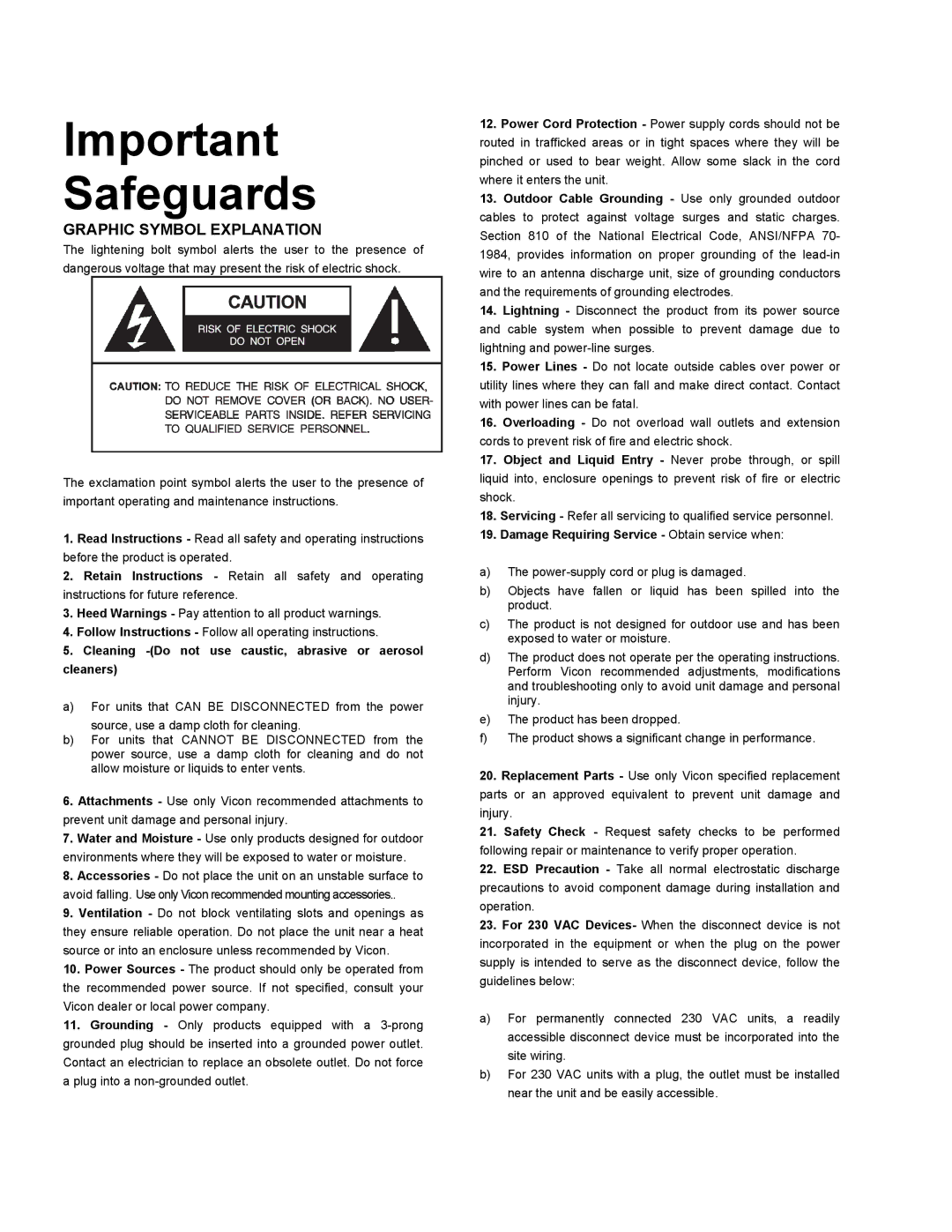
Important
Safeguards
GRAPHIC SYMBOL EXPLANATION
The lightening bolt symbol alerts the user to the presence of dangerous voltage that may present the risk of electric shock.
The exclamation point symbol alerts the user to the presence of important operating and maintenance instructions.
1.Read Instructions - Read all safety and operating instructions before the product is operated.
2.Retain Instructions - Retain all safety and operating instructions for future reference.
3.Heed Warnings - Pay attention to all product warnings.
4.Follow Instructions - Follow all operating instructions.
5.Cleaning -(Do not use caustic, abrasive or aerosol cleaners)
a)For units that CAN BE DISCONNECTED from the power source, use a damp cloth for cleaning.
b)For units that CANNOT BE DISCONNECTED from the power source, use a damp cloth for cleaning and do not allow moisture or liquids to enter vents.
6.Attachments - Use only Vicon recommended attachments to prevent unit damage and personal injury.
7.Water and Moisture - Use only products designed for outdoor environments where they will be exposed to water or moisture.
8.Accessories - Do not place the unit on an unstable surface to avoid falling. Use only Vicon recommended mounting accessories..
9.Ventilation - Do not block ventilating slots and openings as they ensure reliable operation. Do not place the unit near a heat source or into an enclosure unless recommended by Vicon.
10.Power Sources - The product should only be operated from the recommended power source. If not specified, consult your Vicon dealer or local power company.
11.Grounding - Only products equipped with a
12.Power Cord Protection - Power supply cords should not be routed in trafficked areas or in tight spaces where they will be pinched or used to bear weight. Allow some slack in the cord where it enters the unit.
13.Outdoor Cable Grounding - Use only grounded outdoor cables to protect against voltage surges and static charges. Section 810 of the National Electrical Code, ANSI/NFPA 70- 1984, provides information on proper grounding of the
14.Lightning - Disconnect the product from its power source and cable system when possible to prevent damage due to lightning and
15.Power Lines - Do not locate outside cables over power or utility lines where they can fall and make direct contact. Contact with power lines can be fatal.
16.Overloading - Do not overload wall outlets and extension cords to prevent risk of fire and electric shock.
17.Object and Liquid Entry - Never probe through, or spill liquid into, enclosure openings to prevent risk of fire or electric shock.
18.Servicing - Refer all servicing to qualified service personnel.
19.Damage Requiring Service - Obtain service when:
a)The
b)Objects have fallen or liquid has been spilled into the product.
c)The product is not designed for outdoor use and has been exposed to water or moisture.
d)The product does not operate per the operating instructions. Perform Vicon recommended adjustments, modifications and troubleshooting only to avoid unit damage and personal injury.
e)The product has been dropped.
f)The product shows a significant change in performance.
20.Replacement Parts - Use only Vicon specified replacement parts or an approved equivalent to prevent unit damage and injury.
21.Safety Check - Request safety checks to be performed following repair or maintenance to verify proper operation.
22.ESD Precaution - Take all normal electrostatic discharge precautions to avoid component damage during installation and operation.
23.For 230 VAC Devices- When the disconnect device is not incorporated in the equipment or when the plug on the power supply is intended to serve as the disconnect device, follow the guidelines below:
a)For permanently connected 230 VAC units, a readily accessible disconnect device must be incorporated into the site wiring.
b)For 230 VAC units with a plug, the outlet must be installed near the unit and be easily accessible.
